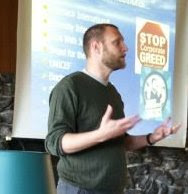Give it all up - Count it all joy
What strikes me first is that Jesus is fleeing the crowd - he is willing to teach, but wary of crowds... crowds seems dangerous, they can take things wrongly, crowds don't seems to think as well as the individuals who make them up, the anonymity of crowds often breeds irresponsibility or dreams of grandeur. Jesus is wary of this, but recognizes that for most people learning in a crowd will be their only (poor) exposure to his teaching.
Simon, the fisherman, first had to respond to Jesus' call (to set out in his boat) before he could ever reap the benefits (nets full of fish). He first had to act without thinking of his own benefits. And as he called his partners out to help him drag in the laden nets, you can almost hear in his voice the glee of the piety-prosperity principle - material prosperity indicates a piety and love of God. You can hear the excitement - how wealthy this one catch will make him, how respected he will be with the town leaders, how well dressed his wife and children will be, he might be able to hire another boat and hands to begin building a real business and then he could really take advantage of God's favor!
But, you see, Simon is a self-aware man, and hears his own thoughts and recoils at them. "Master," he says to Jesus, "I am a sinner" - I don't deserve this bounty, I am not as pious as you think, and God knows the truth. Don't bless me like this when I am so undeserving! Jesus answers tellingly - you will become a fisher of people - your bounty is not with these things, fish and position in town - your bounty is in people and their coming to know creative transformation in the Spirit.
And note what happens next: Simon, and his partners James and John, up and left it all - all that material blessing, all those fish and the prosperity and easier life it meant for them, up and left. Their livelihoods, families, homes and furniture and mortgages and cars and internet service and stocked refrigerators - they left it all. For Luke's readers, the possibility that God would bless the faithful isn't out of the ballpark - God had a history of blessing the faithful, even the Temple Priests and local rabbis said so. What would have been surprising and disturbing would have been that Simon and the others just left it all right there on the beach, abandoned wealth and prosperity and the so-called "blessings" of God. (After all, if God did bless them, what poor stewardship it was to leave it on the beach to be taken by thieves and beggars!) But that was Luke's strategy - his readers should be surprised and a little horrified at the audacity, the foolishness, the lack of wisdom! Luke is impressing on his readers that Jesus is turning the tables, inverting priorities... and in fact, getting them straight as they should be.
Now, later on in Luke they will return to Simon's house, so some connection is maintained there, but Luke is very clear what it means to be a disciple of Jesus: giving up attachment to any and all possessions. Here we have the first disciples - blessed beyond their imaginations with the possibility of wealth and comfort (tempted, like Jesus in the wilderness?) and giving it up to follow him.
Is this what it means to be a disciple in the community of Christ? How much can we ask from our parishoners, ourselves?


